|
|
|
Sort Order |
|
|
|
Items / Page
|
|
|
|
|
|
|
| Srl | Item |
| 1 |
ID:
136438


|
|
|
|
|
| Summary/Abstract |
In 2007, China created the China Investment Corporation (CIC), a sovereign wealth fund (SWF). There is much anxiety about how Beijing will deploy this US$500 billion fund. Specifically, there are concerns that Beijing may use the CIC to sanction others, gain control of other countries’ key assets, or challenge the international order. This analysis demonstrates that China is not wielding its SWF aggressively as an instrument of economic statecraft. Instead, Beijing primarily leverages it in order to advance its domestic objectives. However, China does use the CIC to enhance its natural resource security and build international partnerships.
|
|
|
|
|
|
|
|
|
|
|
|
|
|
|
|
| 2 |
ID:
079589


|
|
|
| 3 |
ID:
103978
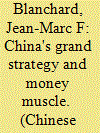

|
|
|
| 4 |
ID:
158653


|
|
|
|
|
| Summary/Abstract |
There is raging speculation about the potential implications of China’s One Belt, One Road (OBOR)/Belt and Road Initiative (BRI) for the global order, spheres of influence and the positions of extra-regional powers. Much commentary is overly broad and lacks a clear and systematic method for examining OBOR/BRI’s future consequences. Focusing on the Maritime Silk Road Initiative (MSRI), a major OBOR/BRI component, in the Southeast Asian context, this article shows China’s own situation and Southeast Asian international and domestic economic and political variables will hinder the complete implementation of the MSRI. Even if the MSRI is fully realized, various factors will limit the political impact of the MSRI’s economic attractions. In short, the MSRI is more likely to yield a Chinese pond than a Chinese lake.
|
|
|
|
|
|
|
|
|
|
|
|
|
|
|
|
| 5 |
ID:
175855
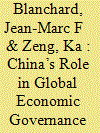

|
|
|
|
|
| Summary/Abstract |
A large proportion of debates about China’s impacts on global economic governance lack systematic empirical analysis. We engage the debate about if China is a revolutionary, revisionist, or status quo state through a deep dive into China’s behaviors with respect to Bilateral Investment Treaties (BITs). This research strategy is à propos because BITs represent the de facto regime governing foreign direct investment (FDI) globally, and China is the world’s second largest signatory of BITs. Drawing upon a database that we created using material on BITs available from the United Nations Conference on Trade and Development, we systematically examine the substantive and procedural provisions of China’s BITs from 2000 onward. Using a qualitative methodology discussed in-depth in our article, we also put China’s BIT practices in comparative perspective by comparing them against the BIT practices of Japan, a leading developed economy with BIT practices reflecting those of other established economies. Our multivariate analysis demonstrates China is not a revolutionary or dramatically revisionist player with respect to BITs. It champions positions that are neither hyper-conservative (state friendly) nor hyper-liberal (FDI friendly). To be more precise, China’s policies, especially with respect to substantive provisions, tend to be conservative, with, to some extent, some liberal aspects. Our analysis, then, indicates that commentators, businesspeople, and policymakers should be cautious about proffering claims that China is dramatically reshaping global economic governance. Aside from this important contribution to the debate, our work also expands knowledge about China’s BITs specifically and BITs generally, which does not reflect adequate attention to BITs from East Asian countries.
|
|
|
|
|
|
|
|
|
|
|
|
|
|
|
|
| 6 |
ID:
153515
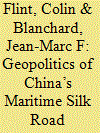

|
|
|
|
|
| Summary/Abstract |
China’s “One Belt, One Road” project is comprised of two components: the Maritime Silk Road Initiative (MSRI) and the Silk Road Economic Belt (SREB)—that were announced separately in 2013. Each component has the potential to transform the global geopolitical landscape through the construction of interrelated infrastructure projects including ports, highways, railways and pipelines. Such hard infrastructure requires the complementary construction of soft infrastructure, such as free trade and investment agreements, and other accords. We introduce a special section focusing specifically on the geopolitics of the MSRI that stems from a workshop hosted in November 2015 in Shanghai. The origins, scope and content of the MSRI are described, along with a summary of the current literature discussing the project, and dominant geopolitical representations. The MSRI is a geopolitical project that involves a number of actors (governments, private companies and Chinese state-owned enterprises) at a number of geographic scales (cities, provinces, states and continents). Arrghi’s twin logics of territorial and economic power help frame and connect the papers of the special section to illustrate the complexity and dynamism of the geopolitics of the MSRI. The articles provide insights into the geopolitics of a large connectivity project.
|
|
|
|
|
|
|
|
|
|
|
|
|
|
|
|
| 7 |
ID:
067320
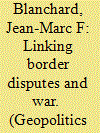

|
|
|
| 8 |
ID:
149045
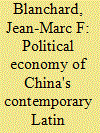

|
|
|
|
|
| Summary/Abstract |
There is a relative dearth of research on China–Latin America political economic relations, especially where Chinese outward foreign direct investment (COFDI) is concerned. In my introductory article, I aim to enrich our knowledge about how external and internal political and economic factors interact to shape Sino–Latin American links. I offer background information on Chinese investment in Latin America, identify several analytical questions that have arisen in conjunction with COFDI in Latin America, and specify some of the key findings of the other articles in this special issue. The contributors indicate that COFDI and other Sino–Latin American economic ties may not be dramatically reshaping host country foreign policies toward China, that positive political relations are not sufficient to ensure smooth economic relations or growing COFDI, and that the activities of Chinese firms in Latin America may be shaped by the host country’s institutional environment and their own operational interests rather than by any dictates from Beijing.
|
|
|
|
|
|
|
|
|
|
|
|
|
|
|
|
| 9 |
ID:
084292


|
|
|
|
|
| Publication |
2008.
|
| Summary/Abstract |
When can economic sanctions and incentives achieve important political objectives? Why do they often fail? We propose a political theory of economic statecraft, arguing that the success of economic statecraft does not depend on the magnitude of its economic effect. Instead, it succeeds when the economic pain or gain it engenders translates into political costs or opportunities. We argue that the political effects of economic signals will depend on a variety of international and domestic political factors, the most important of which is the target state's level of stateness, comprised of three components: autonomy, capacity, and legitimacy. When economic statecraft motivates key domestic coalitions to push for policy change, high stateness enables target state leaders to resist their calls and defy the sender. Conversely, when economic statecraft convinces target leaders that they ought to comply with the sender's demands, high stateness enable them to overcome domestic opposition to compromise. To evaluate the usefulness of our theory, we employ a plausibility probe, testing our approach against three leading alternatives (the realist, economic liberal, and domestic conditionalist approaches) with case studies of Western economic incentives to Hungary and Romania after the Cold War and Indian sanctions against Nepal in the late 1980s.
|
|
|
|
|
|
|
|
|
|
|
|
|
|
|
|
| 10 |
ID:
153516


|
|
|
|
|
| Summary/Abstract |
This article reviews the literature on China’s twenty-first-century Maritime Silk Road initiative (MSRI) to highlight the narratives surrounding it, its central features, its potential objectives, and the challenges affecting its implementation. It demonstrates that there are numerous political and economic narratives about the MSRI. It further indicates Beijing’s aims to use the MSRI to achieve manifold economic and political ends. Distinct from other analyses, it stresses how Beijing sees the MSRI advancing diverse objectives at the sub-national level. It also makes clear that economics and politics are intimately related regarding the MSRI within China, in the Asia-Pacific Region, and outside the region. Another contribution of this review is to underscore the multi-scalar, multi-actor, and multi-dimensional challenges Beijing’s grand scheme faces. From a policy vantage point, this review suggests that some of the alarm about, and some of the more negative interpretations of, the MSRI are, at this point, misplaced or unwarranted. As far as China is concerned, the central policy implication is that China must actively manage the project to implement it fully. In terms of theoretical contribution, this piece shows the value of using political-economic lenses to reflect about what is transpiring as well as the MSRI’s potential political and economic consequences.
|
|
|
|
|
|
|
|
|
|
|
|
|
|
|
|
| 11 |
ID:
171034
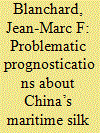

|
|
|
|
|
| Summary/Abstract |
The raging debate about China’s mega Maritime Silk Road Initiative (MSRI) falls into two extreme camps, those that forecast earthshattering effects and those, focused on the MSRI’s numerous contemporary challenges, that see China’s scheme as stagnating or failing. This study plunges into the debate by conducting a macro- and micro-level analysis of the MSRI. The macro-level analysis indicates that the MSRI is not having transformative economic effects. Neither does it show that the MSRI is significantly stalling or collapsing. The microlevel analysis, which focuses on Africa and the Middle East, demonstrates that the MSRI is being embraced and realized in different degrees and highlights reasons for this variation. The article further summarizes and distills various insights flowing from the other pieces in this special issue.
|
|
|
|
|
|
|
|
|
|
|
|
|
|
|
|
| 12 |
ID:
124073


|
|
|
|
|
| Publication |
2013.
|
| Summary/Abstract |
There are numerous studies of Sino-American relations during George W. Bush's tenure in office, but not many investigating it over the course of Barack Obama's stint in the White House. While there are quite a few comparisons of Bush Jr. and Obama's personalities, policies, and accomplishments, there are no systematic comparisons of their China policies. This article aims to rectify these deficiencies by providing detailed information about Obama's policies towards China and a comparison of the two presidents' China policies. It undertakes this comparison across five political, economic, and social issue areas. The first is Bush Jr. and Obama's respective stances towards the Taiwan issue. The second is their dealings with China in regard to security problems. The third is the policies of the two US presidents with respect to economic issues. The fourth is their human rights policies. The fifth is their China doctrines. This study concludes there is little to set apart the China policies of Bush Jr. and Obama despite these individual's many other differences. There are periods such as the two presidents' first years in office where China policy differences were stark, but on the whole the similarities between their policies are greater than the differences.
|
|
|
|
|
|
|
|
|
|
|
|
|
|
|
|
|
|
|
|
|